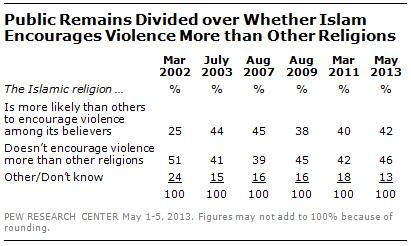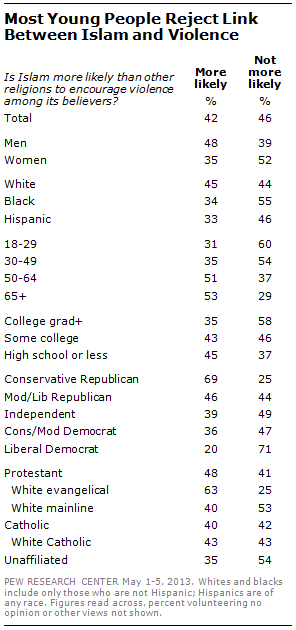Overview
The public’s views of whether Islam is more likely than other religions to encourage violence have changed little in the aftermath of the Boston Marathon bombings.

Currently, 42% say Islam is more likely than other religions to encourage violence among its believers, while 46% say Islam does not encourage violence more than other religions.
These are similar to opinions about Islam and violence for most of the past decade. But in March 2002, six months after the 9/11 attacks, just 25% said Islam was more likely to encourage violence while 51% disagreed.

The new national survey by the Pew Research Center, conducted May 1-5 among 1,504 adults, finds sizable demographic and religious differences in attitudes toward Islam and violence. And the partisan gap is as large as ever: 62% of Republicans say that Islam encourages violence more than other religions, compared with 39% of independents and just 29% of Democrats.
The survey also finds that Muslim Americans are seen as facing more discrimination than some other groups in society, including gays and lesbians, Hispanic Americans, African Americans and women.

Overall, 45% say that Muslim Americans face a lot of discrimination, and 28% say they are subject to some discrimination. Only about one-in-five say that Muslim Americans face only a little (13%) or no discrimination (6%).
About four-in-ten (39%) say that gays and lesbians face a lot of discrimination. Smaller percentages say that Hispanic Americans (25%), African Americans (22%) and women (15%) face a lot of discrimination.
Opinions about Islam and Violence
Most young people continue to reject the idea that Islam is more likely than other religions to encourage violence among its believers. Six-in-ten (60%) of those younger than 30 say

Islam does not encourage violence more than other religions, as do 54% of those 30 to 49. By contrast, about half of those 50 to 64 (51%) and 65 and older (53%) say that Islam is more likely to encourage violence.
There also are gender differences in these opinions: By 48% to 39%, men say Islam is more likely than other religions to encourage violence; women, by 52% to 35%, disagree.
The wide partisan differences in these opinions are even starker among ideological groups: Fully 69% of conservative Republicans say Islam encourages violence more than other religions. About the same percentage of liberal Democrats (71%) say that Islam is no more likely than other religions to encourage violence.
Among religious groups, most white evangelical Protestants (63%) say that Islam is more likely than other religions to encourage violence. White Catholics are divided (43% more likely, 43% not more likely).
By 53% to 40%, white mainline Protestants say Islam does not encourage violence more than other religions. The balance of opinion is similar among the religiously unaffiliated (54% to 35%).
Views of Discrimination against Muslim Americans, Other Groups
There are sizable partisan differences in views of discrimination against Muslim Americans and other groups included in the survey. Nearly twice as many Democrats (57%) as Republicans (29%) say Muslim Americans face a lot of discrimination. About half of independents (47%) say the same.

Democrats also are more likely than Republicans to see a lot of discrimination against Hispanics (by 23 points), African Americans (22 points), gays and lesbians (19 points) and women (11 points).
Age also is a factor in these opinions: About half of those under 30 (51%) and 30-49 (49%) say there is a lot of discrimination against Muslim Americans. That compares with 42% of those 50-64 and just 35% of those 65 and older.
There also are substantial differences between the youngest and oldest age groups in perceptions of discrimination against gays and lesbians: 51% of those younger than 30 think there is a lot of discrimination against gays and lesbians, compared with 28% of those 65 and older.
Notably, blacks, whites and Hispanics are all about equally likely to say there is a great deal of discrimination against Muslim Americans (47% of blacks and Hispanics and 45% of whites). When it comes to perceptions of discrimination against blacks and Hispanics, however, the differences are much greater. Nearly half of blacks (46%) say there is a lot of discrimination against African Americans, compared with a quarter of Hispanics (25%) and 16% of whites.
About four-in-ten blacks (43%) and Hispanics (38%) say there is a lot of discrimination against Hispanic Americans, compared with 20% of whites.
Notably, blacks are about as likely to say there is a lot of discrimination against Muslim Americans (47%) and Hispanic Americans (43%) as against African Americans (46%). Far more whites see a lot of discrimination against Muslim Americans than either Hispanic Americans (20%) or African Americans (16%).




